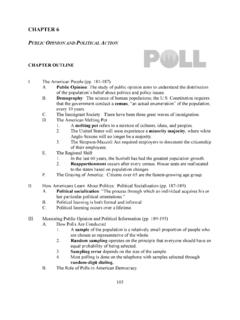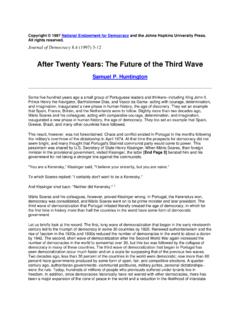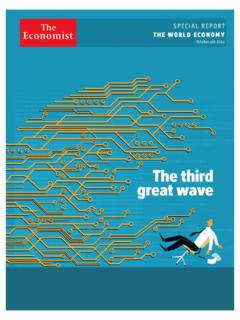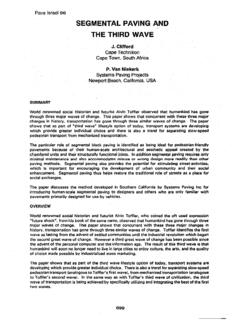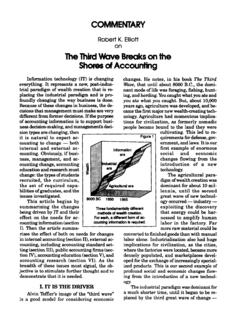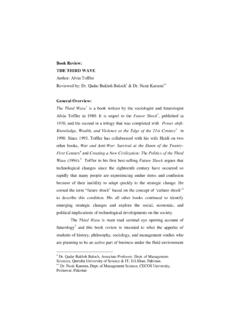Transcription of Harvard Journal of Law & Technology
1 Harvard Journal of Law & Technology Volume 9, Number 1 Winter 1996 CREATING A NEW CIVILIZATION: THE POLITICS OF the third wave By Alvin and Heidi Toffler) Atlanta, Ga.: Turner Publishing, Inc. 1995. Pp. 112. $ (soft). It must be nice to be on Congress's must-read list. Alvin and Heidi Toffler found themselves there after long-time friend Newt Gingrich became Speaker of the House. Previously known for such futurist works as Future Shock, Powershift, and the third wave , the Tofflers' latest disquisition provides a bold revolutionary tract. Whether or not readers accept the Tofflers' vision of the future, Creating a New Civilization deserves examination, if for no other reason than to know what Congress is using as mind-fodder these days.
2 In Creating a New Civilization, the Tofflers describe an inevitable new world order, and how to survive w and even profit from -- its arrival. The Tofflers assert that history is trisected into three potentially clashing civilizations. First Wave civilization emerged around 8,000 as a result oftbe agricultural revolution. Second Wave civilization arose with the Industrial Revolution and introduced mass production, consumption, education, media, corporations, political parties, and a new family structure. A third Wave is now arriving, bearing a civilization of information that conflicts with its predecessors. The central resource buoying the third wave is not land, labor, or capital, but knowledge, which the Tofflers suggest includes everything from data, inferences, and assumptions, to values, imagination, and intuition.
3 third Wave nations create and exploit this knowledge by marketing information, innovation, management, culture, advanced Technology , software, education, training, medical care, and financial services to the world. De-massification characterizes the third wave ; once it has fully arrived, mass manufacturing, mass education, and mass media will no longer exist (p. 31). Short runs of customized products, smaller labor unions, collapsing industrial giants, and weakening TV networks will replace these mass structures (pp. 28-31). The Toffiers view this transition as manifesting itself in computer-driven manufactur- ing technologies that allow cheap customization and product diversity, thus reducing economies of scale.
4 Computers allow miniaturization, I. Alvin & Heidi Toffler, noted social thinkers and scholars, have written several books about politics, management philosophy, and social change. The 1995 version of the book includes chapters fi-om earlier books and follows a limited educational edition. 226 Harvard Journal of Law & Technology [Vol. 9 which decreases warehousing and transportation costs, as well as just-in- time delivery programs that slash the costs of waiting inventory. Although the transition from Second Wave brute-force economies to third Wave brain-force economies began in the 1950s and accelerated in the early 1970s, the transformation remains far from complete (p. 3 I). Meanwhile, the upheaval caused by the transition has had and will continue to have profound effects on family life, education, employment, and polities.]
5 Recognizing the inevitability of the third wave will allow people to direct its course. The Toftlers note that "It]he globally competitive race will be won by the countries that complete their third Wave transformation with the least amount of domestic dislocation and unrest" CO. 34). Due to the rise in "mind work" and the accompanying decline in manual jobs (in Tofflerian terms, the shit% from a proletariat to a cognitariat (p. 55)), workers in the third wave 's economy will become less interchangeable. As a result, manual workers should prepare themselves for jobs in the human service industry, in fields such as elderly care, child care, health service, personal security, training services, leisure and recreation services, and tourism.
6 The Terriers suggest raising the traditionally low wages for service-sector jobs by increasing productivity and inventing new forms of work-force organiza- tion and collective bargaining that are more supportive of work-at-home programs, flex-time, and job-sharing. In addressing the political impact of the third wave , the Tofflers point out that the Second Wave- third Wave schism has generated two basic political camps (not to be confused with the Republican/Democrat or liberal/conservative dichotomies). Those supporting Second Wave civilization are "tenaciously dedicated to preserving the core institutions of industrial mass society m the nuclear family, the mass education system, the giant corporation, the mass trade union, the centralized nation-state and the politics of pseudorepresentative government" (p.)
7 73). Second Wave elites, as well as middle-class and poor Americans, resist the third wave because they fear being displaced by the new order. Yet third Wave proponents recognize that "today's most urgent problems, from energy, war and poverty to ecological degradation and the breakdown of familial relationships, can no longer be solved within the framework of an industrial civilization" (p. 73). The Tofflers also argue that the press focuses on conflicts among Second Wave factions, while attention should be devoted to the struggle between Second and third Wave supporters. The authors note that Second Wavers, when threatened, band together against third Wave interlopers -- witness Gary Hart's unsuccessful 1984 campaign for the Democratic presidential nomination on a "new thinking," third Wave platform.
8 This phenomenon explains other unlikely ailianees such as the No. 1 ] Creating a New Civilization 227 one between Second Wave "Naderites" and "Buchananites" in opposi- tion to the North American Free Trade Agreement (p. 74). The Tofflers claim that Republicans are better situated than Democrats to benefit from the third wave , noting that "[f]rom Hart in the '80s to Gore in the '90s, the [Democratic] party's core constituencies make it impossible forthe Democratic Party to follow its most forward thinking leaders" (p. 75). Republicans, meanwhile, are "less rooted in the old industrial Northeast, and thus have an opportunity to position themselves as the party of the third wave " (p. 75). The Tofflers believe Republicans are "basically fight" in supporting broad scale deregulation and the privatization of government operations, and in relying on the creativity made possible by market economies (p.)
9 76). However, the authors fault the GOP for three reasons: the failure of its free-market economists to consider the new role of knowledge; its loyalty to corporate dinosaurs; and its downplaying of the social dislocations likely to accompany the third wave . While both parties need to avoid nostalgic celebrations of America's industrial zenith, the Tofflers suggest that since Republican "nostalgia pushers" exist on the fringes of the party, Republican centrists, if"inclusive and open to change, [can] seize the future -- lock, stock and barrel" (p. 77). How will third Wave government take shape? According to the Tofflers, majority rule will become obsolete, while minorities will assume an increasingly important role.
10 The government will operate through a semi-direct democracy, characterized by more individual participation through sophisticated technological systems. "Decisional division," which involves reallocating decisions from the national level to the subnational or transnational level and "opening the system to more minority power," will cure institutional logjams (p. 99). Creating a New Civilization succeeds in portraying the third wave future as the welcome and natural result of human evolution. As cheerleaders for the future, the Tofflers offer a comforting framework in which to place late twentieth-century disjunction. There is an undeniable temptation to accept, without further quibbling, their justification for speedily abandoning the system that has functioned respectably for several centuries.



